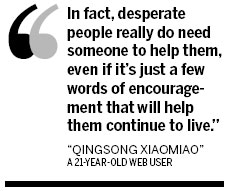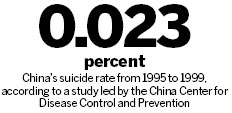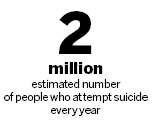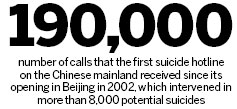Suicide hotlines provide light in the darkness
Updated: 2013-09-11 08:13
By Wang Hongyi (China Daily)
|
||||||||
Suicide is becoming a serious problem in China, but nonprofit organizations are increasingly offering solace to desperate people, as Wang Hongyi reports from Shanghai.
Unlike casual Web surfers who browse for information or fun, Qingsong Xiaomiao (her web nickname) carefully checks the latest posts from her circle of online friends, looking for indications that any of them is potentially suicidal.
The 21-year-old, who declined to give her real name, is severely depressed as a result of a "huge psychological trauma", which she is unwilling to talk about. The problem has caused her so much pain that she has attempted to end her life nine times.
She spoke to China Daily during the runup to World Suicide Prevention Day, an annual event aimed at raising awareness, which fell on Sept 10.
Depression can increase the likelihood of a suicide attempt by a factor of 20, according to studies by the China Center for Disease Control and Prevention.
During Qingsong's latest suicide attempt, in April, she was saved by a 24-hour suicide hotline in Shanghai.
"When we received her call, we discovered that she was in an extremely dangerous condition, so we started a series of emergency efforts and tried to comfort her," said Kong Yilan, a volunteer at the Life Crisis Intervention hotline, Shanghai's first 24-hour suicide hotline.

Qingsong, who lives in Liaoning province, receives regular counseling and is in constant contact with a wide circle of "friends", many of whom have attempted suicide
"I know them quite well. I can fully understand the psychological conditions of suicidal people, because I am just like them," she said. "My personal experiences can help me distinguish the hidden meanings in the simple, disordered words they post online."
She has close connections with five of those people online, who all live in different cities. If Qingsong thinks she has spotted something untoward, she contacts them immediately.
Sources from the hotline said people such as Qingsong comprise one of most vulnerable groups, those who are young and highly stressed.
The hotline was launched by a nonprofit organization, The Life Education and Crisis Intervention Center, at the end of last year. Unlike similar hotlines in the city, it offers its services late at night and early in the morning, the peak times for people to reach out for comfort.
Since it opened last December, the hotline has received 1,692 calls, with people aged 20 to 40 accounting for about 70 percent of them. Around 20 percent of the callers required urgent "crisis intervention".
The operators of the hotline said severe crises mainly affect people in the 20 to 30 age group, rather than those in the 30 to 40 bracket.
"Nowadays, many young people are suffering psychological crises, but are failing to find a way to solve the problem. In some extreme cases, they choose to end their life," said Lin Kunhui, founder of the Life Education and Crisis Intervention Center and secretary-general of the Taiwan Suicide Prevention and Cure Association.
A taboo subject
Suicide is a serious problem in China, where at least three people try to kill themselves every minute. Approximately 287,000 Chinese commit suicide every year and a further 2 million attempt the act, according to the National Health and Family Planning Commission.

The problem is exacerbated by the fact that suicide has long been a taboo subject in China, meaning few studies were conducted into it until the 1990s.
A study led by Canadian suicide expert Michael Phillips and the Chinese CDC shows that from 1995 to 1999, the country's suicide rate was 0.023 percent, one of the highest in the world. The study, the largest ever undertaken in China, questioned the families of suicides in 23 locations across the country and discovered that the highest incidence occurred among the elderly and women in rural areas.
The suicide rate dropped in the decade after the report, largely thanks to tighter controls on pesticides - ingestion of which was once the most common method of committing suicide in rural areas - an improved medical support system and widespread public education.
Younger suicides
However, in recent years a spate of suicides among the young has prompted widespread public and official concern.

On Sept 5, an 11-year-old in Fushun, Liaoning province, jumped to his death from the seventh floor of a building after being criticized by his teacher for violating school regulations.
In June, a 15-year-old girl in Guangzhou, Guangdong province, ended her life by jumping from a high building because she was weighed down by the pressure of academic expectation.
Cases such as this have become almost commonplace in the media, with challenges at work, school or college and in relationships given as the prime motives.

The Chinese CDC said suicide is now the top cause of death among people aged 15 to 34. Many observers have speculated that the rise in the number of suicides among young people is due to the increasing levels of stress imposed by families and schools, especially if the victim is the only child in the family and shoulders the burden of expectation alone.
"When struggling with the pressures of study, work and relationships, they need to find some outlet, or those pressures may easily produce emotional anxieties that will increase the likelihood of suicide," said Zhang Qi, deputy director of the psychological counseling center at East China Normal University.
The pattern of suicide is different in China, too. In the United States, roughly 90 percent of people who commit suicide have a history of acute depression or other mental health issues, but in China, only 60 percent of suicides involve people with such a history, according to the study by the Chinese CDC.
"Children are drilled to perform well in school and they often lack adaptability. When they encounter setbacks, they lose heart and some take extreme measures," Zhang said.
In recent years, the government and schools have paid greater attention to the mental health of students and many schools across China now offer counseling sessions.
"Students should be taught more about the value of life and how to deal with adversity," added Zhang.
Professional counseling
"Potential suicides need company and attention," said Qingsong, explaining that a phone call or text message may help them realize that they are not alone and prompt a change of heart.
"Many readers don't believe people who post online saying they plan to end their life. They simply regard it as sentimental twaddle," she said. "In fact, desperate people really do need someone to help them, even if it's just a few words of encouragement that will help them continue to live."
But for those struggling in the darkness, life-saving intervention may not always be available.

According to the Life Education and Crisis Intervention Center, about 40 percent of the calls it receives come from people living outside of Shanghai, which reflects the large demand for their services.
The first suicide hotline on the Chinese mainland opened in Beijing in 2002. Since then, it has received more than 190,000 calls, and intervened in more than 8,000 potential suicides.
"In Taiwan, the first such hotline began operating in the 1950s, and the 24-hour suicide intervention hotlines can receive as many as 100,000 calls a year on average," Lin said. "However, on the Chinese mainland, the number still lags behind. We still have much work to do."
Of the nearly 1,700 calls received by Lin's hotline, about 60 percent were from first-time callers, which again indicates a huge demand for the service.
"If new cases only accounted for 30 percent, it would suggest that demand for the hotline's services was declining. But at present, significant services are still urgently required," said Lin.
Lin said he is planning to expand the suicide hotlines to more areas and eventually provide an informal, nationwide network.
Contact the writer at wanghongyi@chinadaily.com.cn
|
A young woman sits on the ledge of a high building in Fuzhou, capital of Fujian province. She had threatened to commit suicide, but was dissuaded. Mao Chaoqing / for China Daily |
(China Daily USA 09/11/2013 page9)
Most Viewed
Editor's Picks

|

|

|

|

|

|
Today's Top News
Companies to expand in Latin America
MIT ranks world's top university, PKU 46th
China's economy stable: Davos founder
Russia proposal likely to avert US air strikes
China's Hawaii goes fishing for talent
IPO to land deals in Hollywood
Timetable not set for Six-Party Talks
Li plots the economic course ahead
US Weekly

|

|















